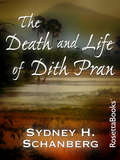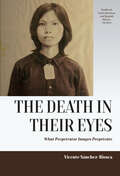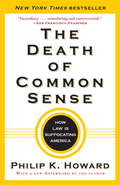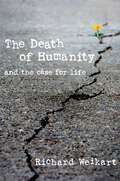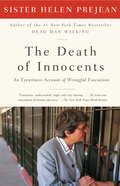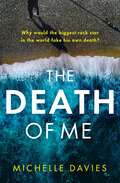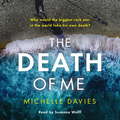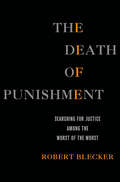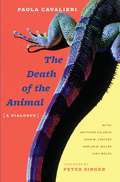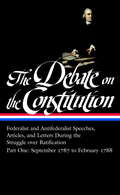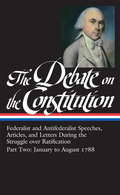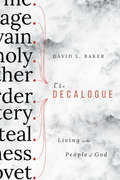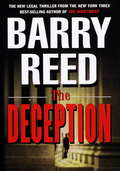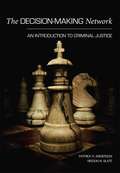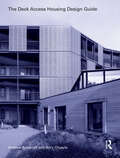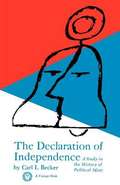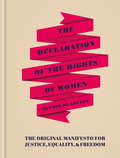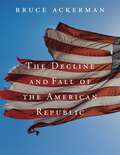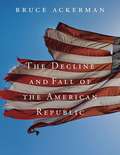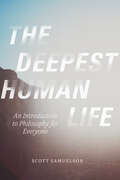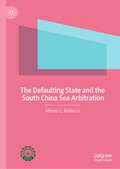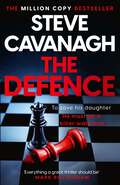- Table View
- List View
The Death and Life of Dith Pran
by Sydney H. SchanbergThe US journalist&’s account of his colleague&’s struggle to survive the Cambodian genocide—the basis for the Oscar–winning film The Killing Fields. On April 17, 1975, Khmer Rouge soldiers seized Phnom Penh—the capital of Cambodia—and began a brutal genocide that left millions dead. Dith Pran, a Cambodian working as an assistant to American reporter Sydney H. Schanberg, was a witness to these events. While his employer managed to escape across the border, Dith Pran fled into the Cambodian countryside—and into the heart of the massacre. The basis for the acclaimed movie The Killing Fields, this is the compelling account of the days before the fall of Phnom Penh. It&’s the story of one man&’s struggle for survival in a country that had become a death camp for millions of its citizens—and another man&’s failed efforts to keep his friend and colleague safe. Written within a year of the atrocities committed by the Khmer Rouge, it is a work of both historical and literary significance. Sydney H. Schanberg contributed a moving new foreword to this first eBook edition.
The Death in their Eyes: What Perpetrator Images Perpetrate (Studies in Latin American and Spanish History #12)
by Vicente Sánchez-BioscaImages that embody the point of view of the perpetrators of violent crimes, or their accomplices, force us to look at the pain of victims through the eyes of those who caused it. Accompanied by over sixty visuals of historically infamous violence, The Death in their Eyes goes beyond the visible aspects of images to reveal what has been left outside of the frame. Covering human abuse and humiliation at Abu Ghraib, the Auschwitz Album, religious desecration during the Spanish Civil War, an unfinished Nazi propaganda film made at the Warsaw Ghetto in the spring of 1942, and detainees at the S-21 torture center in Cambodia under the Khmer Rouge, this volume proposes a rigorous new methodology for analyzing perpetrator images, in photography and film, that continue to be used and re-appropriated in today’s media. Content warning: This book contains images of victims of murder and torture which are essential to the author’s analysis.
The Death of Common Sense: How Law Is Suffocating America
by Philip K. HowardDistressing, disturbing, devastatingly detailed--this stunning examination of how modern laws are diminishing America exposes the drawbacks of rule-bound government, tells why nothing gets done, reveals the phony pretensions of law, and shows why well-intentioned laws have actually devalued rights. In short, The Death of Common Sense demonstrates how the buck never stops and how ell-meaning laws are creating a nation of enemies. (Poltics/Current Events)From the Hardcover edition.
The Death of Humanity: and the Case for Life
by Richard WeikartDo you believe human life is inherently valuable? Unfortunately, in the secularized age of state-sanctioned euthanasia and abortion-on-demand, many are losing faith in the simple value of human life. To the disillusioned, human beings are a cosmic accident whose intrinsic value is worth no more than other animals.The Death of Humanity explores our culture's declining respect for the sanctity of human life, drawing on philosophy and history to reveal the dark road ahead for society if we lose our faith in human life.
The Death of Innocents
by Helen PrejeanFrom the author of the national bestseller Dead Man Walking comes a brave and fiercely argued new book that tests the moral edge of the debate on capital punishment: What if we're executing innocent men? Two cases in point are Dobie Gillis Williams, an indigent black man with an IQ of 65, and Joseph Roger O'Dell. Both were convicted of murder on flimsy evidence (O'Dell's principal accuser was a jailhouse informant who later recanted his testimony). Both were executed in spite of numerous appeals. Sister Helen Prejean watched both of them die.As she recounts these men's cases and takes us through their terrible last moments, Prejean brilliantly dismantles the legal and religious arguments that have been used to justify the death penalty. Riveting, moving, and ultimately damning, The Death of Innocents is a book we dare not ignore.From the Trade Paperback edition.ng on the forensic evidence, which he claimed would exonerate him, but the courts refused. After his execution on July 23, 1997, the state destroyed the evidence. As a result, its conviction of O'Dell could never be scrutinized. "The reader of this book will be the first 'jury' with access to all the evidence the trial juries never saw," says Prejean, who accompanied both men to their executions. By using the withheld evidence to reconstruct the crimes for which these two men were convicted, Prejean shows how race, prosecutorial ambition, poverty, election cycles, and publicity play far too great a role in determining who dies and who lives.Prejean traces the historical underpinnings of executions in this country, demonstrating that it is no accident that over 80 percent of executions in the past twenty-five years have been carried out in the former slave states. She also raises profound constitutional questions about an appeals system that decides most death cases on procedural grounds without ever examining their merits.To date, 113 wrongfully convicted persons have been freed from death row. If constitutional protections-due process, assistance of counsel, and equal justice under law-are truly being respected, how is it possible that these people were convicted in the first place? And how can we accept a system so rife with error?Sister Helen Prejean takes us with her on her spiritual journey as she accompanies two possibly innocent human beings to their deaths at the hands of the state. Prejean implores us to reflect on what is perhaps the core moral issue of the death penalty debate: Honorable people disagree about the justice of executing the guilty, but can anyone argue about the injustice of executing the innocent?From the Hardcover edition.
The Death of Me
by Michelle Davies'A twisting tale about the dark undercurrents of fame and fortune. You'll read THE DEATH OF ME with your heart in your mouth.' Erin Kelly Is one of music's greatest mysteries about to be solved?'He was a massive star until he did a headline grabbing retreat from the spotlight - but his disappearing act was FAKED. Fans won't be happy when they find out - his reputation was dead in the water.'When Isaac Naylor committed suicide after a teenage fan was found dead in his hotel room, the world thought it had lost one of the greatest rock stars of a generation. Naylor, lead singer of The Ospreys, had been arrested for causing the girl's death and was on police bail when he drowned himself in the sea off the Devon coast.Now, eight years on, music journalist Natalie Glass stumbles across a blind item on a US gossip website that suggests Naylor's death wasn't quite what it seemed - and he might in fact still be alive.But as she delves deeper into what happened, Natalie finds she has a stark choice: give up trying to find out what happened to Naylor or risk her own obituary ending up in print.
The Death of Me
by Michelle DaviesWhen Isaac Naylor committed suicide after a teenage fan was found dead in his hotel room, the world thought it had lost one of the greatest rock stars of a generation. Naylor, lead singer of The Ospreys, had been arrested for causing the girl's death and was on police bail when he drowned himself in the sea off the Devon coast, leaving two notes addressed to his bandmates and his younger brother, Toby, discarded on the beach.Now, eight years on, music journalist Natalie Glass stumbles across a blind item on a US gossip website that suggests Naylor's death wasn't quite what it seemed - and he might in fact still be alive. The item claims he is the mystery songwriter who has for the past year been submitting lyrics to producers in London via his lawyer for other artists to record. He insists on anonymity and the only person who knows his identity is the lawyer.But as she delves deeper into what happened, the plot to stop her intensifies and Natalie finds she has a stark choice: give up trying to find out what happened to Naylor or risk her own obituary ending up in print.
The Death of Punishment: Searching for Justice among the Worst of the Worst
by Robert BleckerFor twelve years Robert Blecker, a criminal law professor, wandered freely inside Lorton Central Prison, armed only with cigarettes and a tape recorder. The Death of Punishment tests legal philosophy against the reality and wisdom of street criminals and their guards. Some killers' poignant circumstances should lead us to mercy; others show clearly why they should die. After thousands of hours over twenty-five years inside maximum security prisons and on death rows in seven states, the history and philosophy professor exposes the perversity of justice: Inside prison, ironically, it's nobody's job to punish. Thus the worst criminals often live the best lives. The Death of Punishment challenges the reader to refine deeply held beliefs on life and death as punishment that flare up with every news story of a heinous crime. It argues that society must redesign life and death in prison to make the punishment more nearly fit the crime. It closes with the final irony: If we make prison the punishment it should be, we may well abolish the very death penalty justice now requires.
The Death of the Animal: A Dialogue
by Paola CavalieriWhile moral perfectionists rank conscious beings according to their cognitive abilities, Paola Cavalieri launches a more inclusive defense of all forms of subjectivity. In concert with Peter Singer, J. M. Coetzee, Harlan B. Miller, and other leading animal studies scholars, she expands our understanding of the nonhuman in such a way that the derogatory category of "the animal" becomes meaningless. In so doing, she presents a nonhierachical approach to ethics that better respects the value of the conscious self.Cavalieri opens with a dialogue between two imagined philosophers, laying out her challenge to moral perfectionism and tracing its influence on our attitudes toward the "unworthy." She then follows with a roundtable "multilogue" which takes on the role of reason in ethics and the boundaries of moral status. Coetzee, Nobel Prize winner for Literature and author of The Lives of Animals, emphasizes the animality of human beings; Miller, a prominent analytic philosopher at Virginia Polytechnic Institute, dismantles the rationalizations of human bias; Cary Wolfe, professor of English at Rice University, advocates an active exposure to other worlds and beings; and Matthew Calarco, author of Zoographies: The Question of the Animal from Heidegger to Derrida, extends ethical consideration to entities that traditionally have little or no moral status, such as plants and ecosystems. As Peter Singer writes in his foreword, the implications of this conversation extend far beyond the issue of the moral status of animals. They "get to the heart of some important differences about how we should do philosophy, and how philosophy can relate to our everyday life." From the divergences between analytical and continental approaches to the relevance of posthumanist thinking in contemporary ethics, the psychology of speciesism, and the practical consequences of an antiperfectionist stance, The Death of the Animal confronts issues that will concern anyone interested in a serious study of morality.
The Debate on the Constitution Part 1: Federalist and Antifederalist Speeches
by Various Bernard BailynHere, on a scale unmatched by any previous collection, is the extraordinary energy and eloquence of our first national political campaign: During the secret proceedings of the Constitutional Convention in 1787, the framers created a fundamentally new national plan to replace the Articles of Confederation and then submitted it to conventions in each state for ratification. Immediately, a fierce storm of argument broke. Federalist supporters, Antifederalist opponents, and seekers of a middle ground strove to balance public order and personal liberty as they praised, condemned, challenged, and analyzed the new Constitution Gathering hundreds of original texts by Franklin, Madison, Jefferson, Washington, and Patrick Henry--as well as many others less well known today--this unrivaled collection allows readers to experience firsthand the intense year-long struggle that created what remains the world's oldest working national charter.Assembled here in chronological order are hundreds of newspaper articles, pamphlets, speeches, and private letters written or delivered in the aftermath of the Constitutional Convention. Along with familiar figures like Franklin, Madison, Patrick Henry, Jefferson, and Washington, scores of less famous citizens are represented, all speaking clearly and passionately about government. The most famous writings of the ratification struggle -- the Federalist essays of Hamilton and Madison -- are placed in their original context, alongside the arguments of able antagonists, such as "Brutus" and the "Federal Farmer."Part One includes press polemics and private commentaries from September1787 to January 1788. That autumn, powerful arguments were made against the new charter by Virginian George Mason and the still-unidentified "Federal Farmer," while in New York newspapers, the Federalist essays initiated a brilliant defense. Dozens of speeches from the state ratifying conventions show how the "draft of a plan, nothing but a dead letter," in Madison's words, had "life and validity...breathed into it by the voice of the people." Included are the conventions in Pennsylvania, where James Wilson confronted the democratic skepticism of those representing the western frontier, and in Massachusetts, where John Hancock and Samuel Adams forged a crucial compromise that saved the country from years of political convulsion.Informative notes, biographical profiles of all writers, speakers, and recipients, and a detailed chronology of relevant events from 1774 to 1804 provide fascinating background. A general index allows readers to follow specific topics, and an appendix includes the Declaration of Independence, the Articles of Confederation, and the Constitution (with all amendments).
The Debate on the Constitution Part 2: Federalist and Antifederalist Speeches
by Various Bernard BailynHere, on a scale unmatched by any previous collection, is the extraordinary energy and eloquence of our first national political campaign: During the secret proceedings of the Constitutional Convention in 1787, the framers created a fundamentally new national plan to replace the Articles of Confederation and then submitted it to conventions in each state for ratification. Immediately, a fierce storm of argument broke. Federalist supporters, Antifederalist opponents, and seekers of a middle ground strove to balance public order and personal liberty as they praised, condemned, challenged, and analyzed the new Constitution Gathering hundreds of original texts by Franklin, Madison, Jefferson, Washington, and Patrick Henry--as well as many others less well known today--this unrivaled collection allows readers to experience firsthand the intense year-long struggle that created what remains the world's oldest working national charter.Assembled here in chronological order are hundreds of newspaper articles, pamphlets, speeches, and private letters written or delivered in the aftermath of the Constitutional Convention. Along with familiar figures like Franklin, Madison, Patrick Henry, Jefferson, and Washington, scores of less famous citizens are represented, all speaking clearly and passionately about government. The most famous writings of the ratification struggle -- the Federalist essays of Hamilton and Madison -- are placed in their original context, alongside the arguments of able antagonists, such as "Brutus" and the "Federal Farmer."Part Two gathers collected press polemics and private commentaries from January to August 1788, including all the amendments proposed by state ratifying conventions as well as dozens of speeches from the South Carolina, Virginia, New York, and North Carolina conventions. Included are dramatic confrontations from Virginia, where Patrick Henry pitted his legendary oratorical skills against the persuasive logic of Madison, and from New York, where Alexander Hamilton faced the brilliant Antifederalist Melancton Smith.Informative notes, biographical profiles of all writers, speakers, and recipients, and a detailed chronology of relevant events from 1774 to 1804 provide fascinating background. A general index allows readers to follow specific topics, and an appendix includes the Declaration of Independence, the Articles of Confederation, and the Constitution (with all amendments).
The Decalogue: Living as the People of God
by David L. BakerEvangelical Christian Publishers Association
The Deception
by Barry ReedFrom Barry Reed, New York Times best-selling author of The Choice, The Indictment, and The Verdict, comes a suspenseful psychological thriller and courtroom drama involving medical malpractice and sexual intrigue.At seventeen, Donna DiTullio was a highly ranked tennis player with world-class potential. At twenty-one, she's hospitalized as a suicidal manic-depressive. But under the care of Dr. Robert Sexton and with the help of some experimental medication, Donna is ready to be discharged. Then, unexpectedly, she leaps from a fifth-floor balustrade, leaving herself paralyzed and near death.Attorney Dan Sheridan is called in to sue the hospital and its owner, the Archdiocese of Boston. Sheridan presses his investigation against the powerful interests of the Church and the medical establishment, an investigation and subsequent trial that test all of his skill as a lawyer and lead to an ethical dilemma that will nearly cost him his life.
The Decision-Making Network: An Introduction to Criminal Justice
by Patrick R. Anderson Risdon N. SlateThis book attempts to explain the criminal justice decision-making network in America by examining how crimes are defined by the legislature and what importance is placed on various criminal acts.
The Deck Access Housing Design Guide: A Return to Streets in the Sky
by Andrew Beharrell Rory OlcaytoThe Deck Access Housing Design Guide is the first practical design guide to deck access housing. It focuses on the contemporary use of deck access housing, sharing practical guidance and providing in-depth case studies, while also presenting historical context about this flexible and evolving housing type. Despite a chequered history that saw it linked with urban decay and social malaise in the 1970s and 80s, deck access housing today, after a 40-year hiatus, is fast becoming the default solution for mid-rise housing in the UK, and London in particular. This is in part down to architects’ renewed interest in post-war Modernist typologies, but also due to specific planning standards that favour the qualities – dual-aspect plans, ‘public’ front doors – of deck access design. This comprehensive, professional guide spotlights the best contemporary deck access housing in the UK and throughout mainland Europe, explaining and analysing exemplars in detail. Illustrated in full colour throughout with plans, elevations, photographs, project data and annotations, case studies include both new build and retrofit projects, in public housing, co-housing and Third Age residential projects. Good architectural practice flows from an informed understanding of cultural and design history coupled with practical guidance and clear analysis of case studies. That is what this book provides for anyone interested in, or involved in the design and delivery of, deck access housing. Featured architects from the UK: AHMM · Apparata · Cartwright Pickard · Collective Architecture · DO Architecture · Hawkins Brown · Haworth Tompkins · Henley Halebrown · Levitt Bernstein · Maccreanor Lavington · Mæ · Matthew Lloyd · Pitman Tozer · Pollard Thomas Edwards · Proctor & Matthews · PRP · RCKa Featured architects from mainland Europe: ANMA · Arquitectura Produccions · Atelier Kempe Thill · Bureau Massa · DAMAST · Estudio Herreros · Fink + Jocher · KAAN · LEVS · Martin-Löf · MEF · Muñoz Miranda · Passelac & Roques · Waechter + Waechter
The Declaration of Independence: A Study in the History of Political Ideas
by Carl BeckerCarl Becker's important study is an analysis of the concepts expressed in the Declaration of Independence. Here is a lucid explanation of what the Declaration really is, what views it sets forth, where those views arose, and how they have been accepted or modified by succeeding generations. A book that every American should read.
The Declaration of the Rights of Women: The Originial Manifesto for Justice, Equality and Freedom
by Olympe De GougesOlympe de Gouges was the most important fighter for women's rights you've never heard of. An activist and writer in revolutionary Paris, she published 'The Declaration of the Rights of Women' in 1791, and was beheaded two years later, her articulate demands for equality proving too much for their time.<P><P>Over one hundred and fifty years later, the key statements of her declaration were internationally endorsed by the United Nations in its Declaration on the Elimination of Discrimination Against Women, which in turn went on to be legally recognized by nearly every country in the world. <P>This volume presents both of these key texts along with enlightening and inspiring commentary from a host of powerful women, from Virginia Woolf to Hillary Clinton.
The Decline and Fall of the American Republic (Tanner lectures on human values #6)
by Bruce AckermanConstitutional thought is currently dominated by heroic tales of the Founding Fathers — who built an Enlightenment machine that can tick-tock its way into the twenty-first century, with a little fine-tuning by the Supreme Court. However, according to Bruce Ackerman, the modern presidency is far more dangerous today than it was when Arthur Schlesinger published the Imperial Presidency in 1973. In this book, he explores how the interaction of changes in the party system, mass communications, the bureaucracy, and the military have made the modern presidency too powerful and a threat to liberal constitutionalism and democracy. Ackerman argues that the principles of constitutional legitimacy have been undermined by both political and legal factors. On the political level, by “government by emergency” and “government by public-opinion poll”; on the legal, by two rising institutions: The Office of Legal Counsel in the Department of Justice and the Office of the Presidential Counsel in the White House. Both institutions came out of the New Deal, but have gained prominence only in the last generation. Lastly, Ackerman kicks off a reform debate that aims to adapt the Founding ideal of checks-and-balances to twenty-first century realities. His aim is not to propose definitive solutions but to provoke a national debate on American democracy in its time of trouble.
The Decline and Fall of the American Republic (The Tanner Lectures on Human Values, Book #12)
by Bruce AckermanBruce Ackerman shows how the institutional dynamics of the last half-century have transformed the American presidency into a potential platform for political extremism and lawlessness. Watergate, Iran-Contra, and the War on Terror are only symptoms of deeper pathologies. Ackerman points to a series of developments that have previously been treated independently of one another--from the rise of presidential primaries, to the role of pollsters and media gurus, to the centralization of power in White House czars, to the politicization of the military, to the manipulation of constitutional doctrine to justify presidential power-grabs. He shows how these different transformations can interact to generate profound constitutional crises in the twenty-first century--and then proposes a series of reforms that will minimize, if not eliminate, the risks going forward. The book aims to begin a new constitutional debate. Americans should not suppose that Barack Obama's centrism and constitutionalism will typify the presidencies of the twenty-first century. We should seize the present opportunity to confront deeper institutional pathologies before it is too late.
The Decline of Mercy in Public Life
by Alex Tuckness John M. ParrishThe virtue of mercy is widely admired, but is now marginalized in contemporary public life. Yet for centuries it held a secure place in western public discourse without implying a necessary contradiction with justice. Alex Tuckness and John M. Parrish ask how and why this changed. Examining Christian and non-Christian ancient traditions, along with Kantian and utilitarian strains of thought, they offer a persuasive account of how our perception of mercy has been transformed by Enlightenment conceptions of impartiality and equality that place justice and mercy in tension. Understanding the logic of this decline, they argue, will make it possible to promote and defend a more robust role for mercy in public life. Their study ranges from Homer to the late Enlightenment and from ancient tragedies to medieval theologies to contemporary philosophical texts, and will be valuable to readers in political philosophy, political theory, and the philosophy of law.
The Deepest Human Life: An Introduction to Philosophy for Everyone
by Scott SamuelsonThis accessible and thought-provoking introduction to philosophy shows how the eternal questions can shed light on our lives and struggles.These days, we generally leave philosophical matters to professional philosophers. Scott Samuelson thinks this is tragic, for our lives as well as for philosophy. In The Deepest Human Life, he restores philosophy to its proper place at the center of our humanity, rediscovering it as our most profound effort toward understanding, as a way of life that anyone can live. Exploring the works of some of history’s most important thinkers in the context of the everyday struggles of his students, Samuelson guides readers through the most vexing quandaries of existence—and shows just how enriching the examined life can be. Samuelson begins at the beginning: with Socrates, and the method he developed for approaching our greatest mysteries. From there he embarks on a journey through the history of philosophy, demonstrating how it is encoded in our own personal quests for meaning. Through heartbreaking stories, humanizing biographies, accessible theory, and evocative interludes like “On Wine and Bicycles” or “On Zombies and Superheroes,” Samuelson invests philosophy with the personal and vice versa. The result is a book that is at once a primer and a reassurance—that the most important questions endure, coming to life in each of us. Winner of the 2015 Hiett Prize in the Humanities
The Defaulting State and the South China Sea Arbitration
by Alfredo C. Robles Jr.This book focuses on the legal and procedural problems caused by China’s default in the South China Sea Arbitration. Many of these problems arose because in several respects, China departed from the conduct of other defaulting States in cases before the International Court of Justice. The book argues that the Tribunal, confronted with the difficulties of maintaining the balance between two parties in a situation of default, drew on the full range of its powers to ensure that neither China nor the Philippines would suffer from China’s default. Further, the book describes the shortcomings of the submissions of putative amicus curiae. It refutes China’s questioning of the independence and impartiality of the experts and of the judges. In so doing, it explains the expert opinions and the Tribunal ’s assessments of the latter in the areas of satellite imagery, coral reef ecology, and navigational safety, while rebutting the half- truths and counter-truths disseminated by Chinese scholars about the proceedings. The book compares China’s threats to the independence of the Tribunal to its behavior towards Chinese judges. It places China’s accusations of bias against the Tribunal in the context of China’s domestic situation, and concludes that the Tribunal, acting independently and impartially, was able to perform the judicial function, despite China’s default.
The Defence: Win the trial. Or lose his life. (Eddie Flynn Ser.)
by Steve CavanaghEDDIE FLYNN HAS 48 HOURS TO SAVE HIS DAUGHTER...* * * * *'Everything a great thriller should be and I can't wait to see more of Eddie Flynn.' Mark Billingham'So Hollywood, punchy and cool and pacy as hell.' Eva Dolan* * * * *Eddie Flynn used to be a con artist. Then he became a lawyer. Turned out the two weren't that different.It's been over a year since Eddie vowed never to set foot in a courtroom again. But now he doesn't have a choice. Olek Volchek, the infamous head of the Russian mafia in New York, has strapped a bomb to Eddie's back and kidnapped his ten-year-old daughter, Amy. Eddie only has forty-eight hours to defend Volchek in an impossible murder trial - and win - if he wants to save his daughter. Under the scrutiny of the media and the FBI, Eddie must use his razor-sharp wit and every con-artist trick in the book to defend his 'client' and ensure Amy's safety. With the timer on his back ticking away, can Eddie convince the jury of the impossible?**Featuring an extract from Steve Cavanagh's new thriller, The Plea*** * * * *Praise for race-against-time legal thriller writer, Steve Cavanagh:'A gripping, twisty thriller'Ian Rankin, number 1 bestselling author of Rather Be The Devil'Legal thrillers are my blind spot, but I'll always make an exception for Steve Cavanagh. Quite simply, THE PLEA is one of the most purely entertaining books you'll read this year. It's a blast.' John Connolly, bestselling author of the Charlie Parker series'In the crowded field of legal thrillers, Steve Cavanagh stands head and shoulders above the competition, with his skilfully plotted, action-packed and big-hearted Eddie Flynn novels . . . highly intelligent, twist-laden and absolutely unputdownable'Eva Dolan, author of the critically acclaimed Tell No Tales'A cleverly constructed legal thriller combined with a classic locked-room mystery. Eddie Flynn is fast becoming one of my favourite fictional heroes and Cavanagh one of my favourite thriller writers.' S.J.I. Holliday, author of Black Wood'Raymond Chandler could have created Eddie Flynn. THE PLEA is Phillip Marlowe and Michael Connolly's Mickey Haller combined, with a bit of Jim Thompson's THE GRIFTERS thrown in. A superb read with a main character destined to be one of the most talked about in crime fiction.' Howard Linskey, author of The Search* * * * *If you like John Grisham, Lee Child and Michael Connelly, you will LOVE the gripping and twisty Eddie Flynn series:1. The Defence2. The Plea3. The Liar4. Thirteen* Each Eddie Flynn thriller can be read as a standalone or in series order *
The Defence: Win the trial. Or lose his life. (Eddie Flynn Series)
by Steve CavanaghEDDIE FLYNN HAS 48 HOURS TO SAVE HIS DAUGHTER...* * * * *'Everything a great thriller should be and I can't wait to see more of Eddie Flynn.' Mark Billingham'So Hollywood, punchy and cool and pacy as hell.' Eva Dolan * * * * *Eddie Flynn used to be a con artist. Then he became a lawyer. Turned out the two weren't that different.It's been over a year since Eddie vowed never to set foot in a courtroom again. But now he doesn't have a choice. Olek Volchek, the infamous head of the Russian mafia in New York, has strapped a bomb to Eddie's back and kidnapped his ten-year-old daughter, Amy. Eddie only has forty-eight hours to defend Volchek in an impossible murder trial - and win - if he wants to save his daughter. Under the scrutiny of the media and the FBI, Eddie must use his razor-sharp wit and every con-artist trick in the book to defend his 'client' and ensure Amy's safety. With the timer on his back ticking away, can Eddie convince the jury of the impossible?**Featuring an extract from Steve Cavanagh's new thriller, The Plea*** * * * *Praise for race-against-time legal thriller writer, Steve Cavanagh:'A gripping, twisty thriller' Ian Rankin, number 1 bestselling author of Rather Be The Devil'Legal thrillers are my blind spot, but I'll always make an exception for Steve Cavanagh. Quite simply, THE PLEA is one of the most purely entertaining books you'll read this year. It's a blast.' John Connolly, bestselling author of the Charlie Parker series'In the crowded field of legal thrillers, Steve Cavanagh stands head and shoulders above the competition, with his skilfully plotted, action-packed and big-hearted Eddie Flynn novels . . . highly intelligent, twist-laden and absolutely unputdownable' Eva Dolan, author of the critically acclaimed Tell No Tales'A cleverly constructed legal thriller combined with a classic locked-room mystery. Eddie Flynn is fast becoming one of my favourite fictional heroes and Cavanagh one of my favourite thriller writers.' S.J.I. Holliday, author of Black Wood'Raymond Chandler could have created Eddie Flynn. THE PLEA is Phillip Marlowe and Michael Connolly's Mickey Haller combined, with a bit of Jim Thompson's THE GRIFTERS thrown in. A superb read with a main character destined to be one of the most talked about in crime fiction.' Howard Linskey, author of The Search* * * * *If you like John Grisham, Lee Child and Michael Connelly, you will LOVE the gripping and twisty Eddie Flynn series:1. The Defence2. The Plea3. The Liar4. Thirteen* Each Eddie Flynn thriller can be read as a standalone or in series order *
